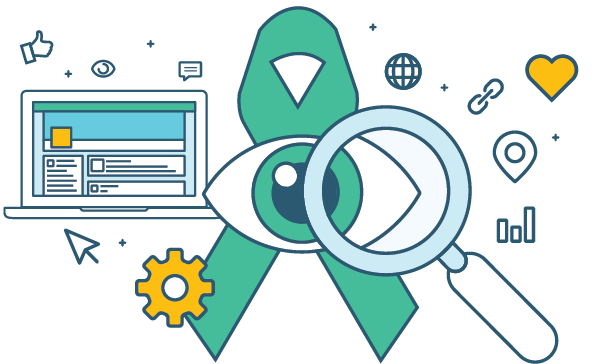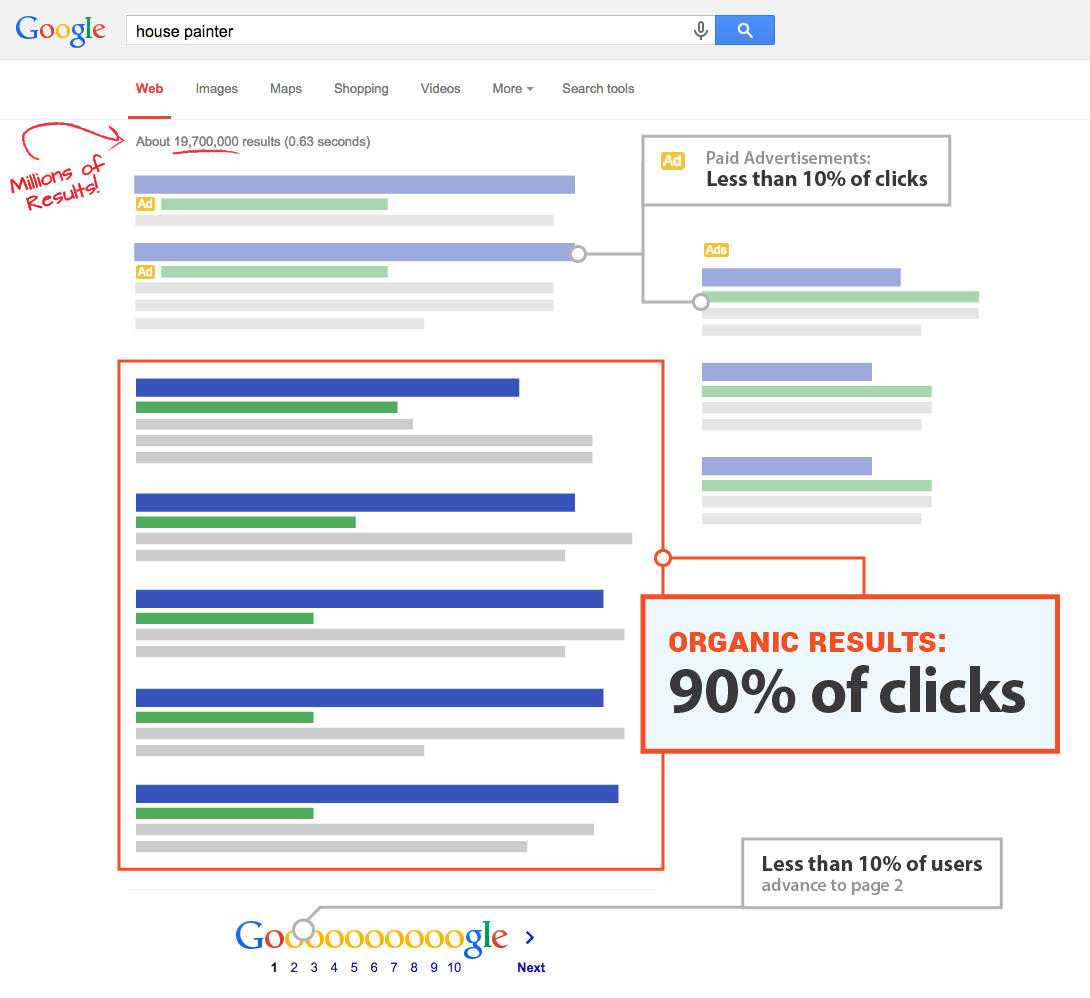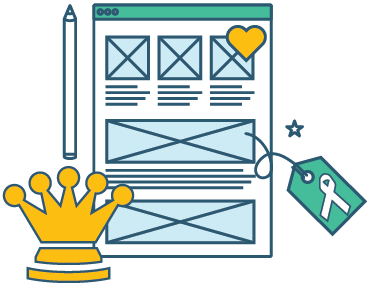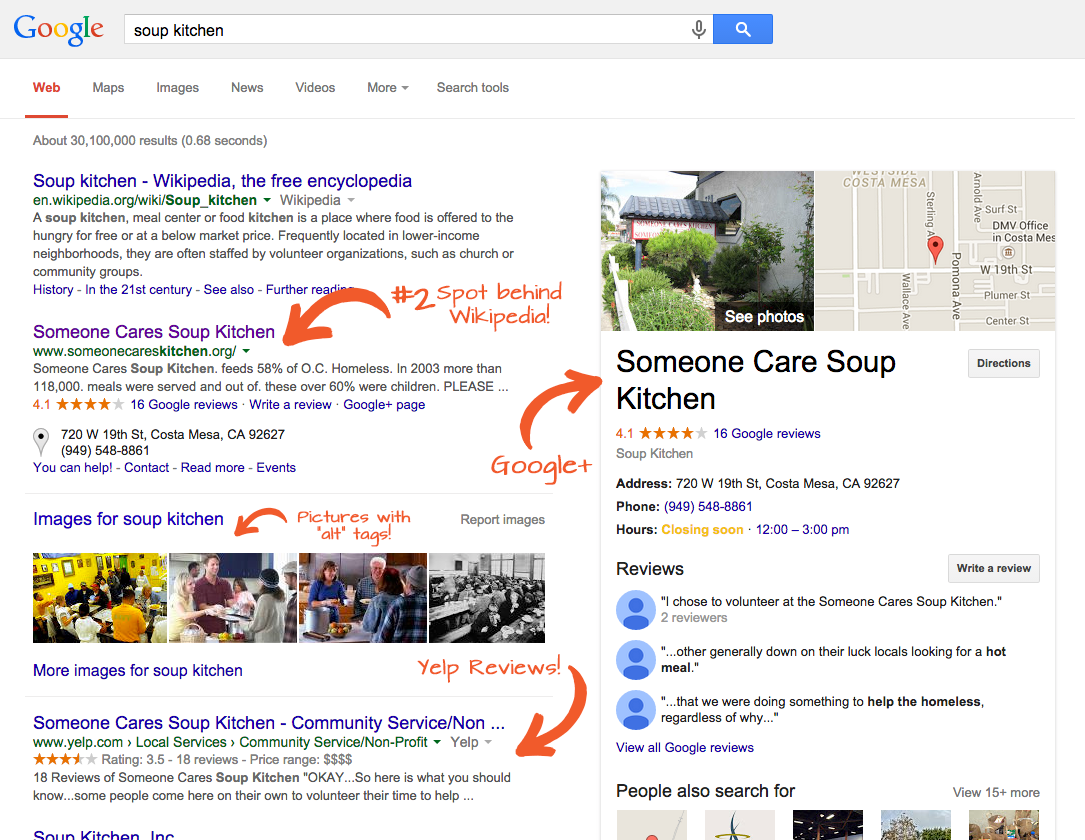Before you skip over this article! For those of you who are new to the whole concept of search rankings, I encourage you to give this article a chance! You probably know more than you think and will be able to make some of these tips work for your nonprofit.
Search Engine Optimization, or “SEO”, has become a frequent topic among marketing and development directors at nonprofit organizations. While most marketers know that SEO can benefit their organization, few understand the factors that impact search and what you can do to help your organization establish a more competitive position in the Google search rankings.
What is Search Engine Optimization?
On it’s most basic level, SEO is a strategy for making an organization’s website easier to find on search engines like Google, Bing and Yahoo.
Search Engine Optimization is the process of optimizing the code and content of a website so that it is perceived by search engines, such as Google, as being highly relevant for certain search terms. The benefit of a well-executed SEO program is that your site will achieve higher search rankings for targeted keywords, which drives more new users and better quality traffic to your website.
For example, if you are looking for someone to paint your house and you Google “house painter”, you are going to get a list of search results for companies that will happily provide that service. In fact, you’ll probably get tens of millions of results:
The ultimate objective of SEO is to get a website to appear on the first page of search results. Getting on the first page of search engine results is the holy grail for marketers because websites that show up first get far more traffic – 90% of all clicks – compared to websites that fall to the second or third pages, which receive less than 10% of traffic.
Websites that naturally show up on the first page because of their relevancy are known as “organic search results“. Results that are “non-organic”, such as pay-per-click ads which you see on the top and sides of search results, still only receive a fraction of visitors – also less than 10%.
Why is SEO Important for Nonprofits?
Depending on your cause, having a website that ranks well for certain search terms in your area can dramatically improve both your fundraising efforts and your ability to fulfill your charity’s mission.
- Fundraising: Potential donors who care deeply about a cause or social issue are going to use search engines like Google to do research and find out how they can help. If these same supporters can easily find you on the first page of their search results, they are going to be more likely to visit your website, learn more about your cause, possibly donate money and even become an active supporter.
- Your Mission: Ranking well with search engines can also have a positive impact on your ability to fulfill your mission. You can use optimized content to spread awareness and make it easier for those you’re trying to help to find your nonprofit.
SEO Overview for Nonprofits
In the sections below we will outline some of the basic SEO elements that have an impact on your search rankings. We’ve also offered some tips from professional consultants who implement SEO strategies on a daily basis. Try using these tips yourself to see if you can improve your search rankings, your web traffic, and ultimately, the potential donors that come through your website.
The search engine algorithms evaluate hundreds of factors in determining who should rank #1 for a particular keyword. Following are some of the most important elements of the search algorithm:
Content is King
Well-written content is the cornerstone of any SEO program, and the best place to publish this content is on a blog. If don’t already have a blog set up for your website, there’s never been a better time than today!
What should you post on your blog?
As an expert on all topics surrounding your cause, you can use your blog to publish posts with stories from your mission, news, images, statistics, videos and other great content to lead supporters and potential beneficiaries to your website.
Your goal with the blog should be to develop useful and relevant content that is interesting enough for people to what to read it. Furthermore, if your content is useful, relevant and interesting, it is more likely to get shared on social media, driving more traffic back to your website (more on that in a minute).

Related: 9 Essentials of Nonprofit Content Marketing [INFOGRAPHIC]Publishing useful and relevant blog content online has become a crucial part of the donor development process. Learn the essentials of implementing an effective strategy for you organization. Read More →
Here is a list of just some of the content you can post that will help boost your SEO efforts:
- Stories from you cause
- News Articles (Recap/Response)
- Information/Statistics
- Infographics
- Testimonials
- Event recaps
- Photo gallerys
- Videos
- Slideshares/Powerpoints
- Webinars
A few key tips in developing content for your website:
- Focus on Quality – Is your content original and does it provide a unique perspective that readers will not find elsewhere? If so, search engines will like it!
- Target Keyword Families – Search engines are smart. They understand synonyms, plurals, and underlying meaning. Write your content to target concepts rather than keywords. For example, let’s say you are targeting the keyword “animal shelter”. Instead of writinga blog post and stuffing it with as many mentions of “animal shelter” as possible, try writing about the number of abandoned cats and dogs in your area and the importance of having a sanctuary to protect these neglected animals. Search engines are smart enough to know when you’re writing to try to game the system. If you write useful content that is relevant and interesting for readers, you will be rewarded with better rankings.
- Long Content Ranks – Studies have shown that longer content ranks better. How long should your content be? SEO strategists typically target 1,500 words for ideal length.
Positive User Experience
What is User Experience or UX? User Experience is how well your users are able to interact with your site. A few key points to consider with respect to user experience:
- Easy to Navigate – Is your site easy to navigate? Poll a few of your users and see if there are any areas of your website that are confusing to the end user.
- Load Time – Users are not patient. If your site loads slowly, your audience will not likely wait around.
- Mobile Optimized – Mobile users are a rapidly growing sector of your audience, which means more people are visiting your website using their mobile phone or tablet than their desktop computer. This is a trend that will continue, so make sure you don’t neglect your mobile audience! Make sure your website is “Mobile Optimized” using responsive design so that it can be easily viewed on a smartphone or tablet of any size. Many search algorithms, like Google’s, now require a mobile optimized experiences in order to rank well. Try visiting your website using a smartphone and see how easy it is to navigate and find information on your website. If it’s difficult to click links because they’re so small, and you have to zoom in and out to navigate each page, it may be time to think about updating your website. Many free services, such as WordPress, offer out-of-the-box templates that are easy to set up and are already mobile optimized.
While you may not be able to make changes to code and design of your site yourself, there are an abundance of freelancers available to assist at a reasonable price.
Social Popularity & Reputation
Search Engines want to reward the “cool kids”. How do you know if your site is popular? It largely comes down to three factors:
- Social Shares – How popular your site is on social media will have a major impact on rankings. Encourage your followers to Like, Retweet, and Share your content through all social media channels – and don’t forget to use Google+!
- Back links – Links to your site from other reputable sites can significantly help rankings. More is not necessarily better with links, so focus on who you know – ask your donors to link to your site and you’ll be amazed at how much this helps your rankings.
- Traffic – The true measurement of popularity is the amount of traffic on your site. Ensure that you are promoting your website through all of your marketing efforts, both online and offline. That means plastering your URL on every poster, sign and pamphlet you distribute so that anyone who wants to learn more about your cause will do so through your website. More traffic begets more traffic!
Stay Local
Search engines include a geographic bias in the algorithm, which means that not only will you rank better for search terms related to your region, such as “Soup Kitchen Orange County,” but you will also rank better for general terms, like “Soup Kitchen” when somebody searches near your location.
Local search rankings can be improved with a few easy steps:
- Create a Google+ Page – There are so many social media sites that it is tough to prioritize which you should use. Because Google+ pages help your search rankings, particularly your local rankings, you will want to make sure you have an active Google+ page.
- Encourage Reviews – Search engines look at reviews on sites like Google+ and Yelp as a gauge of your nonprofit’s credibility. More positive reviews mean you will get preferential treatment in rankings over sites that have few or poor reviews.
- Use Google Maps – Google likes to reward those who use its products. Add a Google Map image to your contact page on your website. Google gives ranking priority to those sites that use its products.
Tips from the Pros
While Google’s search ranking algorithm is very complex and measures over 200 factors to determine the rankings for each search term, there are a number of very straightforward tactics that are used by the SEO pros to immediately enhance a site’s search rankings, and some of these are easy enough for you to try on your own.
The following tips, which can be updated through a content management system (CMS), such as WordPress, will help your site gain immediate ranking traction for your targeted search terms:
- Optimize Title Tags – One of the most important ranking factors is the presence of a strongtag on a web page. Make sure your title tags begin with a keyword, read naturally, are no longer than 68 characters andare not be “over-stuffed” with keywords.
- Optimize Meta Description – The meta description is typically managed through a CMS right next to the title tag. A well optimized meta description contains your target keywords and a compelling value proposition to entice the viewer to click. There’s no point in getting rankings if you don’t get clicks!
- SEO-Friendly URLs – A third easy-to-optimize piece of content on your site is the actual URL for your pages. Make sure that URLs are reasonably short (5 words or less), include your targeted keyword, and use hyphens to separate the words (not underscores).
Case Study: Someone Cares Soup Kitchen
A well-structured SEO program will generate search results for both general search terms, such as “Soup Kitchen,” and regional search terms, such as “Orange County Soup Kitchen.”
Our friends at Someone Cares Soup Kitchen are doing well with search engine rankings by focusing on a few key points:
- Optimized Google+ Page – As mentioned above, Google likes when you use its products. Make sure Google+ is part of your SEO strategy.
- Strong Social Signals – Someone Cares is very active on Facebook, which improves its popularity measurement and helps its search rankings.
- Strong Content – On the About Us page, the content is authentic and written for a human audience, but it uses the keywords “soup kitchen” (14x) and “Orange County” (5x) throughout the content, which clearly indicates to search engines the most relevant keywords in their content.
Do you have any questions or personal experience with optimizing your nonprofit’s website? We want to hear about it! Leave a comment below and tell us your story.
{{cta(‘8ee7d503-c9ba-4b63-83cd-0d389f063597′,’justifycenter’)}}


 Example: Click to Enlarge
Example: Click to Enlarge




 Click to Enlarge
Click to Enlarge